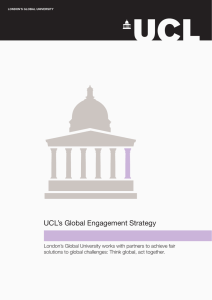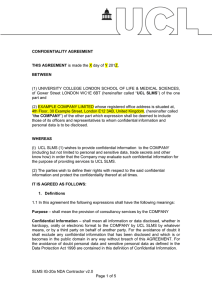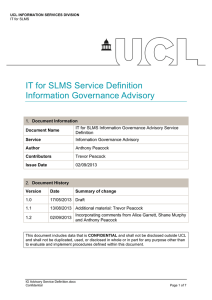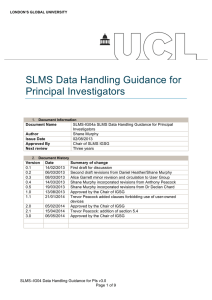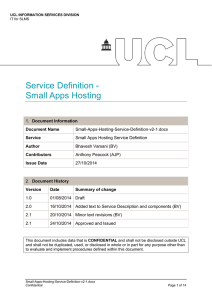INFORMATION ABOUT SLMS IMPACT PhD STUDENTSHIPS GENERAL INFORMATION
advertisement
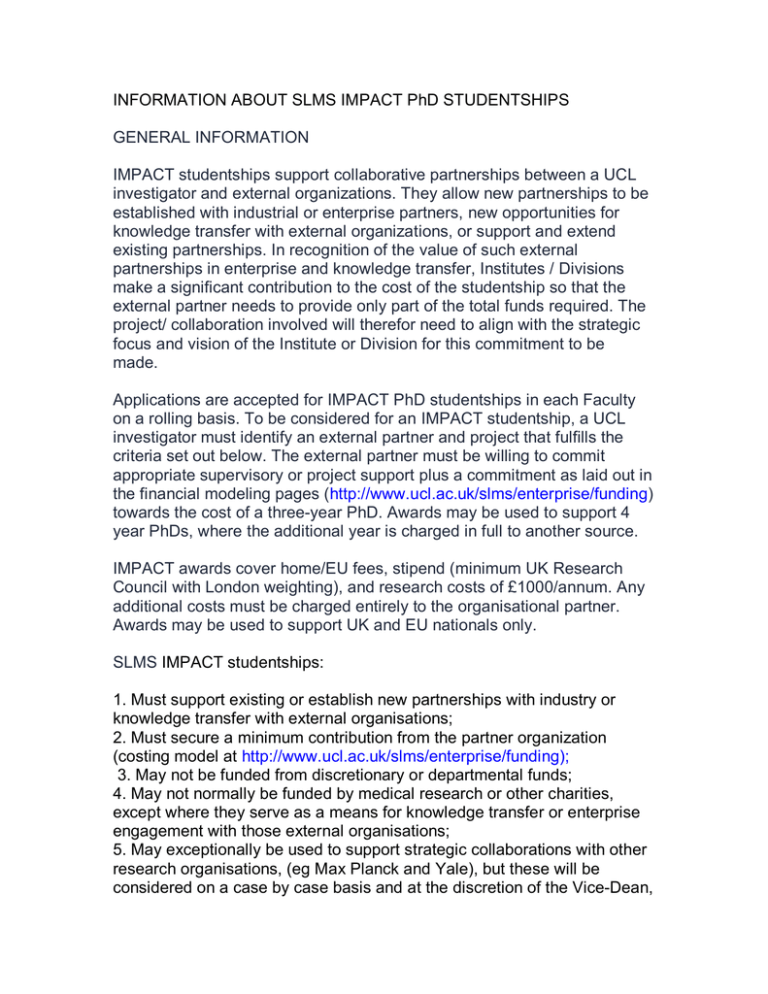
INFORMATION ABOUT SLMS IMPACT PhD STUDENTSHIPS GENERAL INFORMATION IMPACT studentships support collaborative partnerships between a UCL investigator and external organizations. They allow new partnerships to be established with industrial or enterprise partners, new opportunities for knowledge transfer with external organizations, or support and extend existing partnerships. In recognition of the value of such external partnerships in enterprise and knowledge transfer, Institutes / Divisions make a significant contribution to the cost of the studentship so that the external partner needs to provide only part of the total funds required. The project/ collaboration involved will therefor need to align with the strategic focus and vision of the Institute or Division for this commitment to be made. Applications are accepted for IMPACT PhD studentships in each Faculty on a rolling basis. To be considered for an IMPACT studentship, a UCL investigator must identify an external partner and project that fulfills the criteria set out below. The external partner must be willing to commit appropriate supervisory or project support plus a commitment as laid out in the financial modeling pages (http://www.ucl.ac.uk/slms/enterprise/funding) towards the cost of a three-year PhD. Awards may be used to support 4 year PhDs, where the additional year is charged in full to another source. IMPACT awards cover home/EU fees, stipend (minimum UK Research Council with London weighting), and research costs of £1000/annum. Any additional costs must be charged entirely to the organisational partner. Awards may be used to support UK and EU nationals only. SLMS IMPACT studentships: 1. Must support existing or establish new partnerships with industry or knowledge transfer with external organisations; 2. Must secure a minimum contribution from the partner organization (costing model at http://www.ucl.ac.uk/slms/enterprise/funding); 3. May not be funded from discretionary or departmental funds; 4. May not normally be funded by medical research or other charities, except where they serve as a means for knowledge transfer or enterprise engagement with those external organisations; 5. May exceptionally be used to support strategic collaborations with other research organisations, (eg Max Planck and Yale), but these will be considered on a case by case basis and at the discretion of the Vice-Dean, Enterprise of the relevant Faculty. PROCESS Applications are considered on a rolling basis and must be submitted by prospective supervisors. They should only specify one project and student, although multiple applications comprising multiple studentships are permitted provided the match-funding expectation is satisfied for each individual studentship. Applications must clearly articulate the anticipated impact of the new collaboration, and may not be used to support existing students. Proposals should be on the application form (to be found at http://www.ucl.ac.uk/slms/enterprise/application.doc which comprises: A description of the research question and proposed project; statement of how the new collaboration fits the requirements of the scheme signatures of approval/support from the relevant Head(s) of Division/ Institute and Institute Manager/ Finance lead; A letter of confirmation of financial support from the project partner should be appended. Completed applications should be emailed to the relevant Faculty ViceDean for Enterprise: Medical Sciences: Professor Rachel Chambers: r.chambers@ucl.ac.uk Life Sciences: Professor Neil Millar: n.millar@ucl.ac.uk Brain Sciences: Professor Steve Moss: s.moss@ucl.ac.uk Population Health Sciences: Professor Steve Humphries: steve.humphries@ucl.ac.uk Once submitted, the application will be considered by the Vice-Dean and the relevant Faculty Manager and a rapid decision made on award of a studentship, which will be ratified by the Chair of the SLMS Knowledge Transfer and Enterprise Board (currently Professor Geraint Rees g.rees@ucl.ac.uk).
